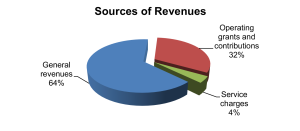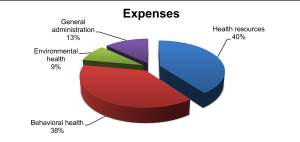Financial and Compliance Audit of the Department of Health
Posted on Apr 12, 2023 in Summary|
AUDITOR’S SUMMARY Financial Statements, Fiscal Year Ended June 30, 2022 THE PRIMARY PURPOSE of the audit was to form an opinion on the fairness of the presentation of the financial statements for the Department of Health, as of and for the fiscal year ended June 30, 2022, and to comply with Title 2, U.S. Code of Federal Regulations, Part 200, Uniform Administrative Requirements, Cost Principles, and Audit Requirements for Federal Awards (Uniform Guidance), which established audit requirements for state and local governmental units that receive federal awards. The audit was conducted by KMH LLP. Financial Highlights FOR THE FISCAL YEAR ended June 30, 2022, DOH reported total revenues of $1.01 billion and total expenses of $960.6 million, resulting in an increase in net position of $53 million. Revenues included $645.5 million from general revenues, $322.3 million from operating grants and contributions, and $45.8 million from service charges. Expenses included $381.8 million for health resources, $364.4 million for behavioral health, $85.2 million for environmental health, and $129.2 million for general administration. As of June 30, 2022, total assets and deferred outflows of resources exceeded total liabilities and deferred inflows of resources by $1.33 billion. Total assets and deferred outflows of resources of $1.55 billion included (1) cash of $532 million, (2) receivables of $45 million, (3) loans receivable of $729 million, (4) accrued interest and loan fees of $2 million, (5) deferred outflows of resources of $1 million, and (6) net capital assets of $239 million. Total liabilities and deferred inflows of resources totaled $213 million. DOH’s net position of $1.33 billion is comprised of a restricted amount of $877 million, of which $831 million is for loans; an unrestricted amount of $220 million; and net investment in capital assets of $239 million. Auditors’ Opinions Findings There were six material weaknesses and one significant deficiency in internal control over compliance that are required to be reported in accordance with the Uniform Guidance. The material weaknesses are described on pages 101-104 and 107-114 of the report and the significant deficiency is described on pages 105-106 of the report. A material weakness in internal control over compliance is a deficiency, or a combination of deficiencies, in internal control over compliance, such that there is reasonable possibility that material noncompliance with a type of compliance requirement of a federal program will not be prevented or detected and corrected on a timely basis. A significant deficiency in internal control over compliance is a deficiency, or a combination of deficiencies, in internal control over compliance with a type of compliance requirement of a federal program that is less severe than a material weakness in internal control over compliance, yet important enough to merit attention by those charged with governance. |
| About the Department
The mission of the Department of Health (DOH) is to protect and improve the health and environment for all people in Hawai‘i. DOH administers and oversees statewide personal health services, health promotion and disease prevention, mental health programs, monitoring of the environment, and the enforcement of environmental health laws. It administers federal grants to support the State’s health services and programs and is organized into four major administrations: Behavioral Health Services Administration, Health Resources Administration, Environmental Health Administration, and General Administration. |


